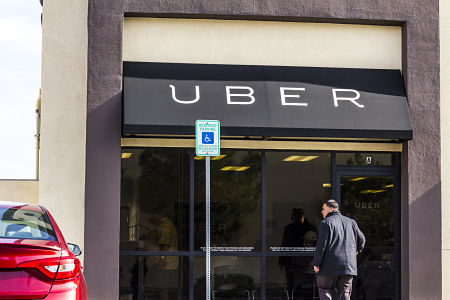After being forced to shut down its self-driving car field test in San Francisco last December, Uber is now reporting the company will resubmit an application to the California Department of Motor Vehicles.

Uber had previously argued that its vehicles require oversight by a human driver and therefore shouldn’t fall under California’s autonomous-driving rules. After the state attorney general threatened legal action if the company continued operating the automobiles without a permit, Uber started looking elsewhere.
Anthony Levandowski, Uber's vice president for advanced technologies, said cars driven by Uber still have a driver capable of assuming control at any time.
"We have a person sitting in the driver's seat, and there's also a person next to them looking at the system and trying to confirm that everything is going well," he added. "They are able to override and take control of the vehicle at any time."
California regulations define autonomous vehicles as having the capability to drive "without the active physical control or monitoring of a natural person." Uber has argued that the law does not apply to its cars, which cannot stay in autonomous mode continuously. A driver and an engineer are in the front seats to take over frequently in sticky traffic situations such as construction zones or pedestrian crossings.
Uber launched a field test in Arizona after the California DMV shut down the field test but plans to resume testing in California if their application is approved, according to the company.
Uber said its self-driving cars are back on the road in San Francisco, but only to collect mapping data. Uber says that its interpretations of the technology haven’t changed, nor have the regulations.
“These cars are legally registered and are being driven manually,” an Uber spokesperson said in a statement. “We are taking steps to complete our application to apply for a DMV testing permit. As we said in December, Uber remains 100 percent committed to California.”
A DMV spokesperson added, “Uber hasn’t formally submitted their autonomous vehicle tester program application, but just as we would with any other manufacturer, the DMV is providing assistance with the steps necessary to apply for and receive a test permit.”
Uber’s regulatory battle with California DMV comes as Google’s self-driving subsidiary filed a lawsuit against Uber, alleging that the ride-hailing company had stolen its autonomous technology. Uber said the claims were “baseless.”
Waymo, the self-driving car company owned by Google’s parent Alphabet, filed a suit against Uber alleging that the ride-share company engaged in the “calculated theft” of its self-driving technology.
The lawsuit, filed in U.S. district court in San Francisco, contains allegations that a former Waymo employee, Levandowski, plotted to steal Waymo’s technology and trade secrets before leaving to start his own self-driving truck company, Otto. Uber acquired Otto in August 2016, reportedly for $680M.
At the center of the suit is Waymo’s proprietary LiDAR system – the “eyes” that self-driving cars use to see other vehicles, the road and pedestrians. Waymo says that it spent seven years and significant amounts of money developing its LiDAR – and alleges that Uber’s recent advances in self-driving technology are due to its theft of the Waymo LiDAR design.
“The configuration and specifications of our LiDAR sensors are unique to Waymo,” the company said in a blogpost. “Misappropriating this technology is akin to stealing a secret recipe from a beverage company.”
